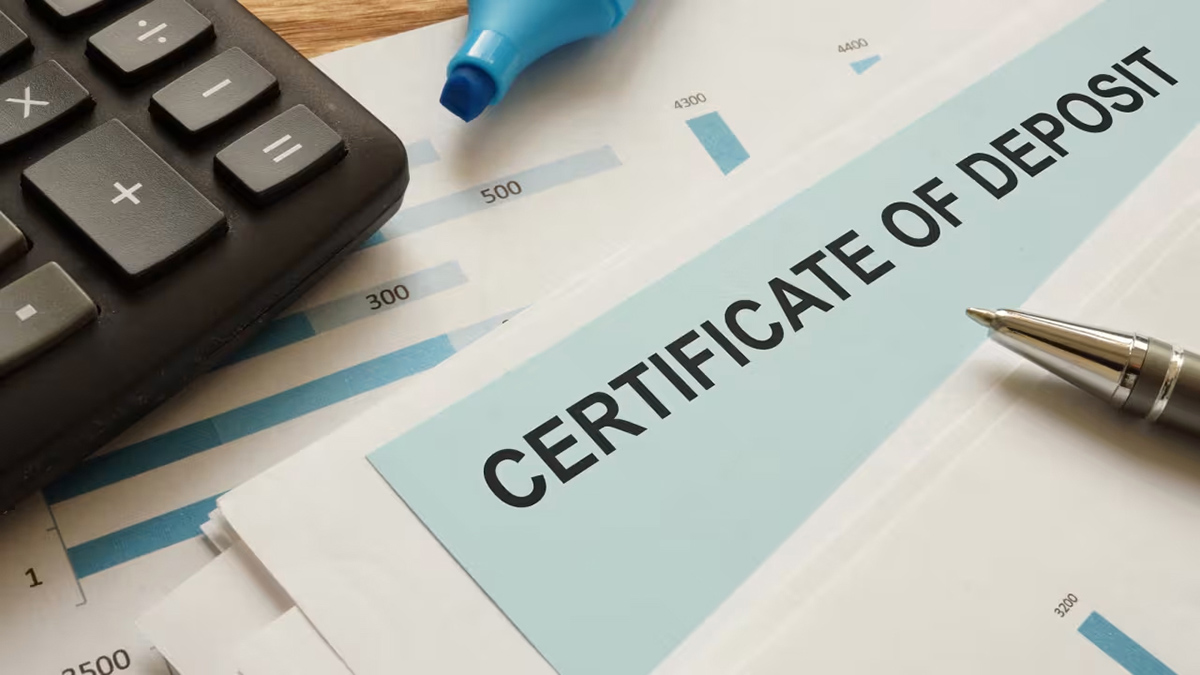

Finance
How To Find Old Certificates Of Deposit
Modified: December 29, 2023
Looking to access old certificates of deposit? Learn how to find them and manage your finances effectively with our helpful guide.
(Many of the links in this article redirect to a specific reviewed product. Your purchase of these products through affiliate links helps to generate commission for LiveWell, at no extra cost. Learn more)
Table of Contents
- Introduction
- Understanding Certificates of Deposit
- Reasons for Finding Old Certificates of Deposit
- Step 1: Gather Relevant Information
- Step 2: Contact the Original Bank
- Step 3: Check with the FDIC
- Step 4: Search Unclaimed Property Databases
- Step 5: Consult with a Banker or Financial Advisor
- Step 6: Utilize Online Resources and Websites
- Step 7: Consider Hiring a Professional Researcher
- Conclusion
Introduction
Certificates of Deposit (CDs) are a popular investment tool that offers a safe and secure way to grow your savings. However, over time, it is common for individuals to misplace or forget about their old CDs. Whether it’s due to moving, changes in financial institutions, or simply the passage of time, locating old certificates of deposit can sometimes be a challenge.
In this article, we will explore various steps and resources that can help you find old certificates of deposit. By following these methods, you can potentially recover lost funds, track your financial history, and gain a better understanding of your overall financial situation.
While the specific procedures may vary depending on the bank and circumstances, the information provided here will serve as a general guide to help you in your search.
So, if you’ve found yourself wondering how to find those long-lost CDs, read on to discover the steps you can take to locate and retrieve your old certificates of deposit.
Understanding Certificates of Deposit
Before diving into the process of finding old certificates of deposit, it’s essential to have a clear understanding of what exactly a certificate of deposit is.
Certificates of Deposit, commonly referred to as CDs, are time-bound investments offered by financial institutions such as banks and credit unions. They are considered a low-risk option for investors as they guarantee a fixed rate of interest over a specified period.
When you open a CD, you essentially agree to deposit a sum of money with the bank for a predetermined length of time, known as the term or maturity period. This can range from a few months to several years, depending on your preference.
During the term of the CD, you cannot access the funds without incurring penalties. This feature makes CDs an ideal choice for individuals looking to save money over a fixed period without the temptation of withdrawing it.
The interest earned on certificates of deposit is typically higher than what you would receive from a regular savings account. This makes them an attractive option for conservative investors seeking a secure way to grow their savings.
It’s important to note that CDs are not without risk. The main risk is the opportunity cost associated with tying up your money for a specified period. If interest rates rise significantly during the term of your CD, you may miss out on the opportunity to invest in higher-yielding options.
Now that we have a basic understanding of certificates of deposit, let’s explore the reasons you might need to locate your old CDs.
Reasons for Finding Old Certificates of Deposit
There are several reasons why you might need to find your old certificates of deposit. Whether it’s for financial tracking, reclaiming lost funds, or simply satisfying your curiosity, it’s important to know why you are embarking on this search. Here are some common reasons:
- Unclaimed funds: If you have misplaced or forgotten about your old certificates of deposit, there is a possibility that there are unclaimed funds associated with them. By finding and claiming these funds, you can recover money that you may not even be aware of.
- Financial tracking: Your old CDs can serve as important financial records. Locating them can help you track your financial history, monitor interest rates, and gain insight into your past investment choices.
- Updating beneficiary information: If you have named beneficiaries on your old certificates of deposit, it is essential to update their information as circumstances change. Finding your old CDs allows you to ensure that the right individuals are listed as beneficiaries.
- Estate planning: In the unfortunate event of your passing, your old certificates of deposit can be crucial for estate planning purposes. By locating them, you can ensure that your assets are distributed according to your wishes.
- Tax purposes: If you receive interest income from your CDs, you may need to report it for tax purposes. Finding old certificates of deposit can help you accurately report your income and avoid any potential tax issues.
Regardless of your specific reason for wanting to find your old certificates of deposit, the following steps will guide you through the process of locating them efficiently and effectively.
Step 1: Gather Relevant Information
Before you begin the process of finding your old certificates of deposit, it is crucial to gather all the relevant information about the CDs. This information will help streamline your search and increase the chances of a successful outcome. Here are the details you should collect:
- Bank name: Identify the name of the bank or financial institution where you initially opened the certificate of deposit. This will serve as a starting point for your search.
- Date of issue: Determine the approximate date when you obtained the CD. If you don’t remember the exact date, try to recall the year or the time period as closely as possible.
- CD term: Note the duration or term of the certificate of deposit. This refers to the length of time for which you agreed to keep the funds deposited without accessing them.
- CD amount: Remember the amount of money you initially invested in the certificate of deposit. This will help narrow down your search and verify the authenticity of any old certificates you come across.
- CD number: If you have any record of the CD number or account number associated with the certificate of deposit, make a note of it. This can be helpful in identifying the specific CD.
- Personal information: Prepare your personal details, such as your full name, address, and social security number. This information may be required to verify your identity during the search process.
By gathering all this information upfront, you will be well-prepared to initiate contact with the relevant parties and agencies in your quest to find your old certificates of deposit.
Step 2: Contact the Original Bank
Once you have gathered all the relevant information about your old certificates of deposit, the next step is to contact the original bank where the CDs were issued. Start by reaching out to their customer service department or visiting a local branch if available. Follow these guidelines when contacting the bank:
- Provide necessary information: When speaking with customer service representatives, provide them with the details you collected in Step 1. This includes the bank name, date of issue, CD term, CD amount, and any other relevant information. The more specific information you can provide, the easier it will be for the bank to locate your old certificates.
- Verify your identity: The bank may require you to prove your identity before discussing any account-related information. Be prepared to provide personal details, such as your full name, address, social security number, and any other information they may request. This is done to protect your account from unauthorized access.
- Ask for assistance: Request the bank’s assistance in locating your old certificates of deposit. They may have a dedicated department that handles inquiries related to old accounts. Provide all the necessary information and inquire about their process for retrieving old records.
- Follow their instructions: The bank may ask you to fill out specific forms or provide additional documentation to initiate the search. Follow their instructions carefully and provide the requested information promptly. This will help expedite the process and increase the chances of finding your old CDs.
- Stay persistent: If, for any reason, the initial contact with the bank doesn’t yield the desired results, don’t hesitate to follow up. Persistence and open communication can often lead to the successful retrieval of your old certificates of deposit.
Remember, each bank may have its unique procedures and processes for handling inquiries related to old accounts. Be patient and cooperate with their requests to ensure a smooth and successful search.
Step 3: Check with the FDIC
If you are unable to locate your old certificates of deposit by contacting the original bank, the next step is to check with the Federal Deposit Insurance Corporation (FDIC). The FDIC is a government agency that protects depositors and preserves the stability of the banking system. Here’s how you can utilize their resources:
- Visit the FDIC website: Start by visiting the official website of the FDIC (www.fdic.gov) and navigate to their “BankFind” tool. This tool allows you to search for information about banks that are or were insured by the FDIC.
- Enter bank details: Using the BankFind tool, enter the name of the bank where you opened your old certificates of deposit. You can also enter other relevant details, such as location or bank charter number, if available. This will help narrow down the search results.
- Review search results: Once you have entered the necessary information, review the search results to see if the bank is listed. The search results may provide information about the bank’s current status, including whether it is still in operation or has been closed or merged with another institution.
- Contact the FDIC: If the bank is listed as closed or has gone through a merger, contact the FDIC’s customer service or claims department. Provide them with all the information you have about your old certificates of deposit and inquire about their process for handling accounts from closed banks.
- Follow their guidance: The FDIC may require you to fill out specific forms or provide additional documentation to initiate a claim or search for your old certificates. Follow their instructions closely and provide all the necessary information promptly.
- Consult with a financial advisor: If the bank is not listed on the FDIC’s website, or if you encounter any difficulties during the process, consider consulting with a financial advisor or professional who specializes in bank searches or unclaimed funds. They can provide guidance and assistance in navigating the complex procedures.
Checking with the FDIC can be a valuable step in your search for old certificates of deposit, especially if the original bank is no longer operational. Their resources and expertise can help you in your quest to locate and retrieve your old CDs.
Step 4: Search Unclaimed Property Databases
If you still haven’t found your old certificates of deposit after checking with the original bank and the FDIC, it’s time to expand your search by exploring unclaimed property databases. These databases are maintained by state governments and hold unclaimed funds and assets, including forgotten bank accounts, insurance policies, and yes, even old certificates of deposit. Here’s how you can conduct a search:
- Visit state-specific databases: Start by visiting the unclaimed property website of your state government. Most states have an online database that allows you to search for unclaimed funds or property registered under your name.
- Enter personal information: Provide your personal details, such as your full name, current and previous addresses, and social security number, as requested by the database. This information will help narrow down the search results.
- Search for unclaimed property: Look specifically for unclaimed funds or bank accounts within the database. Conduct a thorough search by entering variations of your name and addresses you have lived at in the past.
- Review search results: Once you have submitted your information, review the search results to see if any old certificates of deposit or unclaimed funds are listed under your name. Take note of any relevant details, such as the bank name or account numbers.
- Follow the claims process: If you find any unclaimed property or funds that may be associated with your old certificates of deposit, follow the state’s claims process to initiate a claim. This usually involves completing a claim form and providing supporting documentation.
- Check neighboring states: In addition to searching the database of your home state, consider checking the databases of neighboring states or states where you have previously resided. It’s not uncommon for unclaimed property to be held in a different state than where it was initially opened.
- Create future alerts: If you are not successful in finding your old certificates of deposit in the current search, consider creating alerts or notifications on the unclaimed property websites. This way, if your old CDs are reported as unclaimed in the future, you can be notified and take appropriate action.
Searching unclaimed property databases can be a valuable step in your quest to locate your old certificates of deposit. Even if you don’t find them immediately, it’s worth checking periodically as unclaimed funds and property are continuously added to these databases.
Step 5: Consult with a Banker or Financial Advisor
If your search for old certificates of deposit has been unsuccessful so far, it may be beneficial to seek assistance from a banker or financial advisor. These professionals have expert knowledge and resources that can help you in your quest to locate your old CDs. Here’s how they can assist you:
- Expert guidance: A banker or financial advisor can provide you with expert guidance on navigating the complex banking system and uncovering additional options for locating your old certificates of deposit.
- Access to banking networks: These professionals often have access to extensive banking networks and can use their connections to reach out to other institutions or search for alternative avenues to find your old CDs.
- Industry knowledge: Bankers and financial advisors are well-versed in financial industry practices and may have insights or strategies that you may not be aware of. Their expertise can help you explore unconventional approaches to finding your old certificates of deposit.
- Account tracking: If you have lost track of the banks or financial institutions where you held your old certificates of deposit, a banker or financial advisor can assist you in tracking down those details. They can review your financial records, past statements, or credit reports to identify any overlooked accounts.
- Unclaimed funds expertise: A financial advisor or professional familiar with unclaimed funds can provide valuable guidance on navigating unclaimed property databases and the associated claims process. They can help you understand the requirements and documentation needed to initiate a claim successfully.
- Procedural assistance: If you encounter any challenges or roadblocks during your search, a banker or financial advisor can provide procedural assistance. They can help you understand and navigate any paperwork, forms, or processes required by the banks, financial institutions, or government agencies involved.
Remember, the services of bankers and financial advisors may come with associated fees, so it’s important to discuss their rates and fees upfront to ensure you are comfortable with the cost of their assistance.
By consulting with a banker or financial advisor, you can tap into their industry knowledge, expertise, and resources to boost your chances of locating your old certificates of deposit.
Step 6: Utilize Online Resources and Websites
In today’s digital age, online resources and websites can be valuable tools in your search for old certificates of deposit. There are several websites and platforms that specialize in helping individuals locate and retrieve lost financial assets. Here’s how you can utilize online resources in your quest:
- Financial institution websites: Visit the websites of the banks or financial institutions where you held your old certificates of deposit. Some institutions provide online account access or customer portals that allow you to retrieve information about your past accounts. Log in to your account, if available, and search for any record of your old CDs.
- Online banking services: If you utilized online banking services for your old certificates of deposit, log in to your online banking platform and search for past account statements or transaction history. This can provide valuable information about your old CDs, including account numbers, dates, and maturity periods.
- Financial aggregators: Consider using financial aggregator websites or apps that allow you to link multiple financial accounts in one place. These platforms often have features that can help you track down and organize your old certificates of deposit by consolidating your financial information from various institutions.
- Online search engines: Conduct a web search using relevant keywords such as the bank name, CD term, and date of issue. This may lead you to online forums, discussion boards, or articles where individuals have shared their experiences in locating old certificates of deposit. You may come across helpful tips or success stories that can guide you in your search.
- Financial forums and communities: Participate in online financial forums or communities where individuals discuss banking, investments, and personal finance. Post a query or ask for advice regarding finding old certificates of deposit. Fellow members may share their own strategies or provide useful suggestions based on their experiences.
- Government resources: Explore government websites and resources that provide information on unclaimed property or funds. Many countries have dedicated government-run websites where you can search for unclaimed funds under your name. These websites often provide instructions on how to initiate a claim for any identified funds.
- Online professional services: Consider utilizing online professional services or platforms that specialize in assisting individuals in locating lost financial assets. These services may require a fee, but they can leverage their expertise, technology, and industry connections to help you track down your old certificates of deposit.
By utilizing these online resources and websites, you can expand your search beyond traditional methods and increase your chances of finding your old certificates of deposit.
Step 7: Consider Hiring a Professional Researcher
If you have exhausted all your options and still haven’t been able to locate your old certificates of deposit, it might be time to consider hiring a professional researcher. These individuals or firms specialize in conducting thorough investigations and have access to resources and databases that may not be easily accessible to the general public. Here’s why you should consider hiring a professional researcher:
- Specialized expertise: Professional researchers have extensive knowledge and experience in searching for lost financial assets. They are familiar with the intricacies of the banking industry, unclaimed property databases, and other relevant resources. Their expertise can significantly increase the chances of locating your old certificates of deposit.
- Access to databases and resources: Researchers often have access to proprietary databases, industry contacts, and specialized tools that the average person doesn’t have. They can dig deeper and search more effectively across multiple platforms, increasing the likelihood of finding your old CDs.
- Efficiency and time-saving: Conducting a thorough search for your old certificates of deposit can be a time-consuming task. Hiring a professional researcher frees up your time and energy, allowing them to focus solely on the search while you can attend to other important matters in your life.
- Connections and networking: Professional researchers often have established connections and networks within the financial industry. They can reach out to banks, financial institutions, and government agencies on your behalf, leveraging their relationships to expedite the search process.
- Expert guidance and support: A professional researcher can provide valuable guidance and support throughout the search. They can review your case, advise on the best strategies, and help you understand any legal or procedural aspects involved in locating your old certificates of deposit.
- Confidentiality and privacy: Professional researchers understand the importance of confidentiality and privacy. They adhere to strict ethical standards and ensure that your personal and financial information remains secure throughout the search process.
While hiring a professional researcher may come at a cost, it could be a worthwhile investment, especially if you have been unable to locate your old certificates of deposit through other means. Consider researching and engaging with reputable professionals or firms who specialize in financial asset research to enhance your chances of success.
Conclusion
Locating old certificates of deposit can be a challenging process, but with the right strategies and resources, it is possible to find and retrieve your lost funds. By following the steps outlined in this article, you can increase your chances of locating your old CDs and accessing the money you may have forgotten about or misplaced.
Remember, the initial step is to gather all relevant information about your old certificates of deposit, including the bank name, date of issue, CD term, and amount. Contacting the original bank is often the first logical step, followed by checking with the FDIC and searching through unclaimed property databases.
If these steps don’t yield the desired results, consider consulting with a banker or financial advisor who can provide expert guidance and industry knowledge. Additionally, utilizing online resources and websites, such as financial institution portals and unclaimed property databases, can expand your search capabilities.
If all else fails, hiring a professional researcher who specializes in tracking down lost financial assets can be a valuable option. They have the expertise, resources, and connections to conduct a thorough search on your behalf and increase the likelihood of finding your old certificates of deposit.
Remember to stay persistent and patient throughout the process. Locating old certificates of deposit may take time, but the efforts can be well worth it. By successfully tracking down your old CDs, you can recover forgotten funds, gain a better understanding of your financial history, update beneficiary information, and ensure compliance with tax and estate planning requirements.
Lastly, it is important to take proactive measures to keep track of your financial assets going forward. Keep detailed records of your investments, maintain a centralized system for tracking account information, and stay updated on any changes or updates from your financial institutions.
Good luck in your search for your old certificates of deposit, and may you successfully reclaim your lost funds!














